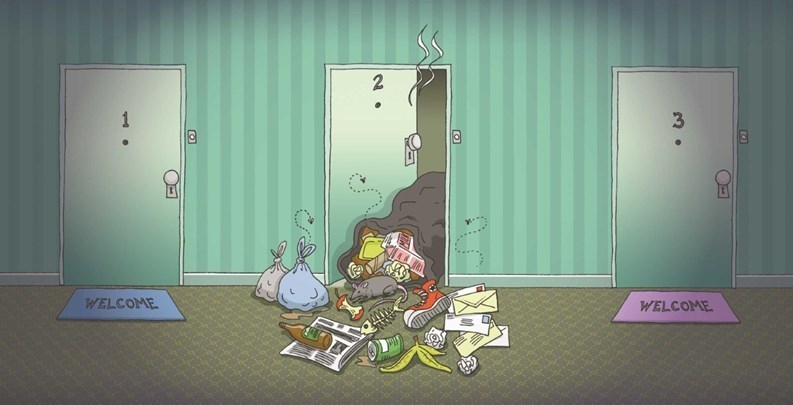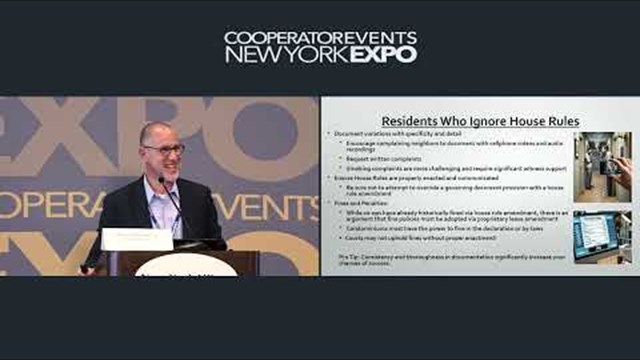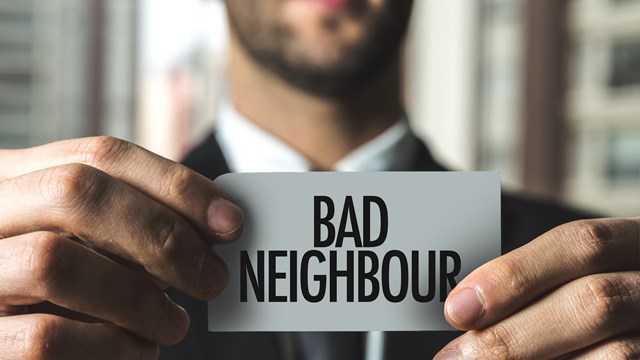The foundation of a condominium or cooperative community rests on the ability of residents to cohabitate in a complimentary – or at the very least, peaceful - manner. Everyone in a building is ostensibly concerned with their investment, and it stands to reason that ensuring the well-being of one's neighbors would only help bolster quality of life for all. The reality is however, that certain people have a propensity for unruly behavior. What happens when these loose cannon types start acting out in ways that are detrimental to the community as a whole? Should they be ignored? Placated? Threatened with eviction proceedings? It obviously depends on specific circumstances, but a board's ability to react appropriately as soon as a problem presents itself is crucial to running an association effectively.
The Misguided Advocate
When a neighbor is disruptive, annoying, or otherwise bothersome, it's easy to overreact and decide that they're just downright nasty people who are deliberately making a pest of themselves. While that certainly may be true occasionally, oftentimes a 'problem tenant' may simply be misguided – or even well-intended – and only transgress due how they execute their whims.
“Many buildings have their eccentrics, so to speak; residents who move to the beats of their own drums and don't do anything illegal, necessarily, but will plaster the building with fliers that present libelous or slanderous claims with no basis,” says Stewart E. Wurtzel, am attorney partner with Tane Waterman & Wurtzel, P.C., in Manhattan. “We had one person in a building who didn't like the repairs that the association was undertaking, so he started doing handiwork of his own. He was fixing stairwells and hallways, to the point where we had to take him to court. Police were called in several instances to stop immediate conduct, we sent notices urging him to cease, we went to court to get an injunction to stop him, and he finally agreed. The chase is ongoing regarding legal fees, defaults and those things. But we were obviously concerned with the safety issues; people didn't trust this person.”
Narcotics Detection
Of course, not all pains in their community's neck are simply delusional would-be maintenance persons. Some are actually acting in flagrant violation of the law, and those folks must be dealt with accordingly.
Rachel Siskind Rubin, an attorney with Manhattan-based Silversmith & Associates, relates an instance where shareholders in an Upper Manhattan co-op were selling drugs from their unit and allowing guests unfettered access to the building, which clearly presented health and safety issues. “Some people were even using public areas of the building as a toilet,” Rubin notes. Suffice to say that things were unpleasant.
“The board had installed surveillance cameras, so it was able to track traffic coming in and out of this specific apartment, and determine how long people were spending in stairwells, which they could then tie into when they found various relevant paraphernalia,” says Rubin. “The house rules provided for the association to post signs warning against these activities. And for a period of years, they were sending notifications to the tenant, asking them to desist. But it was a tricky situation, as one of the co-shareholders of the unit had passed away, and the family had not dealt with the estate. We actually had to go to surrogate court first to deal with that.”
“Once we tackled that first hurdle, we served the shareholder with a notice of a board meeting that would be held to discuss the situation, and we gave them an opportunity to appear in the managing agent's office to defend their behavior - which they did - and we as counsel were present. But the shareholder herself wasn't committing the violations; it was her other family members. She had maybe eight siblings and assorted relatives in the unit, and she expressed to the board that she'd told them to stop, but she really couldn't reign them in. The board then voted to terminate their lease, so we started an objectionable conduct holdover in court. And because we'd had the meeting ahead of time and given her due process, ultimately the court upheld the board's business judgment, and the tenant was eventually evicted.”
Breaking Worse
Sometimes it's a well-intentioned but clueless resident who causes headaches in a community; sometimes it's an issue of a resident's problematic relatives; and sometimes there's an unfortunate nexus of outlandish and even dangerous behavior perpetuated by a member of the community who'd long been perceived as harmless at worse and valuable at best.
For example, “We had a really nice guy with bipolar disorder who'd been living in a building for 30 years,” recalls attorney Ian J. Brandt, a partner with Wagner Berkow, LLP. “Over time, his behavior deteriorated until he started shouting obscenities at parents and children walking in and out of the property. He routinely confronted shareholders with paranoid delusions as to what he believed they were doing to him, and it got to the point where he approached a woman he'd known for 25 years and claimed that he knew that she and her husband wanted to engage in a ménage à trois, all in front of her kids.”
Brandt says that on another occasion, the man actually struck a woman, causing her to hit her head on a wall; while she was badly shaken by the incident, she wasn't demonstrably injured, so when the police arrived, they couldn't do much about it aside from noting that the mentally ill resident was a potentially dangerous person. “Thereafter,” says Brandt, “when someone would call the police on this man, they'd show up and take him to a hospital, only to release him after a day or so. And because he was non-compliant with his medication, the cycle would repeat.”
“So,” Brandt continues, “I was retained to start a Pullman termination [a legal method of filing suit against 'objectionable' or 'nuisance' tenants – Ed.] against the guy. He showed up to the meeting where the board was set to vote on whether his lease should be terminated and him evicted, and he started ranting and raving about how he was an important person in the art world, and that this was all a ruse because the people in the building were 'anti-art.' We then filed an action for preliminary injunction, telling the judge that during the time it took us to go through housing court and get a judgment possession and warrant of eviction, a lot of bad things might happen at the property based on this person's general conduct. We had six affidavits from people who'd been victimized, but the judge was afraid to take any preliminary action that would resemble an eviction before there was a trial. So we asked for an order that Adult Protective Services appoint a social worker to monitor [the resident] on a daily basis to make sure he remained medically compliant, and, via the Pullman termination route, we eventually had the man evicted.”
In an ideal world, neighbors would be, well, neighborly - but this is not that world. A board must be prepared for residents who may transgress upon their fellow shareholders and unit owners, and be willing to step in to mitigate a hostile situation before it gets too far out of hand, even pursuing eviction should the case call for it.
Mike Odenthal is a staff writer and reporter for The Cooperator.










Comments
Leave a Comment